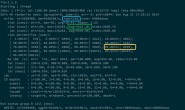目录
- 前言
- 服务部署
- 部署后端
- 1. 进入到sayhello目录
- 2. 编写API的Dockerfile(如果有请之直接构建镜像- 在下一步)
- 3. 构建镜像
- 4. 运行容器
- 5. 访问
IP:8000/message,得到如下页面
- 部署前端
- 1. 进入到sayhello/static目录
- 2. 编写Dockerfile文件(如果有请直接进入第三步)
- 3. 构建镜像
- 4. 启动容器
- 5. 访问IP:9001/message.html
- 参考资料及感谢
前言
昨天发了一个SayHello FastAPI版本,今天部署上自己的服务器了
体验地址: http://49.232.203.244:9001/message.html
服务部署
前置条件:以下在centos7.5 云服务器实验通过
yum -y install git # 安装git curl -sSL https://get.daocloud.io/docker | sh # 安装docker
git clone https://gitee.com/zy7y/sayhello
git clone https://github.com/zy7y/sayhello
上面两个命令选一个执行就可了
部署后端
1. 进入到sayhello目录
cd sayhello
2. 编写API的Dockerfile(如果有请之直接构建镜像- 在下一步)
在sayhello目录下新建如下Dockerfile
FROM python:3.7
COPY . /app
WORKDIR ./app
RUN pip install -r requirements.txt -i https://pypi.tuna.tsinghua.edu.cn/simple/
EXPOSE 80
CMD ["uvicorn", "main:app", "--host", "0.0.0.0", "--port", "80"]
简单说下上面内容做了什么事情,不一定正确加了些个人理解
FROM python:3.7 # 拉取基础镜像python3.7,本机已有该镜像就会使用该镜像,没有就去远端仓库拉取,速度慢就需要换下源地址,百度即可(这里应该就是拉下镜像后弄成了个容器) COPY . /app # 将当前所在目录下所有文件 复制到 容器里面 /app 目录下 WORKDIR ./app # 指定工作目录,我的理解是后面执行的命令 都相当于在这个目录下执行了,根目录的形式吧 RUN pip install -r requirements.txt -i https://pypi.tuna.tsinghua.edu.cn/simple/ # 这步是在容器里面执行 pip 安装依赖 EXPOSE 80 # 将容器中80 端口开放 CMD ["uvicorn", "main:app", "--host", "0.0.0.0", "--port", "80"] # 容器运行时将执行 uvicorn main:app --host 0.0.0.0 --port 80 启动服务
3. 构建镜像
docker build -t sayhello .
4. 运行容器
会自动执行dockerfile里面的CMD命令
docker run -d --name sayhello-fastapi -p 8000:80 sayhello
5. 访问IP:8000/message,得到如下页面

部署前端
先确认message.html中的
baseURL是不是后端服务的IP地址(127.0.0.1 不行)
1. 进入到sayhello/static目录
cd sayhello/static/
2. 编写Dockerfile文件(如果有请直接进入第三步)
FROM nginx:1.15.2-alpine
COPY . /usr/share/nginx/html
COPY nginx.conf /etc/nginx/conf.d/default.conf
EXPOSE 80
CMD ["nginx", "-g", "daemon off;"]
3. 构建镜像
docker build -t sayhello-front .
4. 启动容器
docker run -d --name sayhello-front-9000 -p 9001:80 sayhello-front
5. 访问IP:9001/message.html

参考资料及感谢
感谢资料提供者/作者
- https://aqzt.com/bubble/6513.html
- https://www.cnblogs.com/tian874540961/p/11916832.html
- https://www.runoob.com/docker/docker-dockerfile.html





